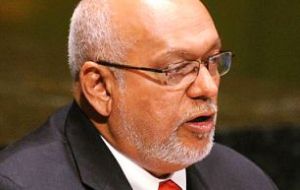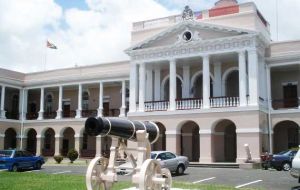MercoPress. South Atlantic News Agency
Unasur member Guyana 'suspends' parliament for up to six months
 Mr Ramotar executed his decision as MPs returned for their first day of work after a two-month recess.
Mr Ramotar executed his decision as MPs returned for their first day of work after a two-month recess.  'Proroguing” would allow the president's administration to work with an opposition-controlled parliament without calling early elections
'Proroguing” would allow the president's administration to work with an opposition-controlled parliament without calling early elections The president of Guyana has suspended the national parliament to avoid MPs passing a vote of no confidence in his government. Donald Ramotar invoked an obscure constitutional procedure to carry out the maneuver.
He said in a statement he was disbanding the legislature with the hope that it might eventually “benefit our people”. But his opponents accused the president of undermining democracy.
Mr Ramotar executed his decision as MPs returned for their first day of work after a two-month recess.
Under a constitutional tool known as “proroguing”, he said he would be able to suspend parliament for a maximum of six months.
The measure would allow the president's administration to work with an opposition-controlled parliament without calling early elections, according to local media in Georgetown.
“Fellow Guyanese,” the president said in a statement, “my decision to exercise this constitutional option was not taken lightly, but it was the sole recourse that was left to me to ensure that the life of the 10th Parliament was preserved.”
However opposition politician, Moses Nagamootoo - whose party filed the September no confidence vote - accused the administration of being “a recalcitrant and renegade government”.
The Cooperative Republic of Guyana was originally a Dutch colony in the 17th century, but by 1815 Guyana had become a British possession. The abolition of slavery led to settlement of urban areas by former slaves and the importation of indentured servants from India to work the sugar plantations.
The resulting ethno-cultural divide has persisted and has led to turbulent politics. Guyana achieved independence from the UK in 1966, and since then it has been ruled mostly by socialist-oriented governments. In 1992, Cheddi Jagan was elected president in what is considered the country's first free and fair election since independence. After his death five years later, his wife, Janet Jagan, became president but resigned in 1999 due to poor health.
Her successor, Bharrat Jadeo, was reelected in 2001 and again in 2006. Donald Ramotar was elected president in 2011. Guyana is a founding member of Unasur and in the process of incorporation to Mercosur.
Guyana headed for dictatorship (*)
Guyana is a country where democracy has traditionally been weak; indeed, for long periods political manipulation has just barely masked some form of dictatorship.
The history of Guyana shows a consistent unwillingness to accept the will of the people as expressed in free and fair elections. The root cause of the undemocratic tendency is the unabated tension between the two ethnic groups, the Afro-Guyanese and the Indo-Guyanese. This persistent, pandemic and virulent racism has become even more perverted and vicious because both tribes see control of the state as a means of distributing scarce benefits in a very poor country.
This practice of racial exclusion from the scarce benefits derivable from the state spawns social and political polarization.
Guyana has a National Assembly which is a unicameral legislature of 65 members of which 25 members are elected from 10 constituencies by proportional representation and 40 members are chosen also on the basis of proportional representation from national lists named by the political parties.
The president is elected for a five-year term on the basis of parliamentary elections which were last held on November 28, 2011. The president is not directly elected. At the time of elections each party presenting a slate of candidates for the assembly must designate a leader who will become president if that party receives the largest number of votes.
The current situation is that the Indo-Guyanese-controlled People’s Progressive Party won 32 seats in the 2011 election and has formed the Government under Mr Donald Ramotar. A coalition of opposition groups, including the People’s National Congress dominated by Afro-Guyanese, and the Alliance for Change, controls the majority of 33 seats in parliament.
The opposition coalition on August 7, 2014 delivered to the clerk of the National Assembly a motion of “no confidence” against the Government of Mr Ramotar, who knows that this will succeed and new elections will be necessary.
Since the announcement of the intention to have a vote of “no confidence” he has refused to convene a sitting of parliament. Now in a move which undermines the democratic process, Mr Ramotar has prorogued parliament for six months, a move some suggest can be repeated until elections are constitutionally due. This would certainly provoke a constitutional crisis.
His specious justification for this undemocratic act is a transparent farce, claiming that proroguing Parliament was his “sole recourse” to preserving the life of the current Parliament and to bring an end to the opposition’s “political gamesmanship”.
Mr Ramotar also gave the “assurance” that the six months’ prorogation would be used to engage the parliamentary opposition in “constructive ways”. He further stated that if no agreement for “normalcy” was reached, then he would have no choice but to hold early general elections.
All this is clearly intended to maintain himself in power and delay elections as long as possible.
Meanwhile, he has done his country considerable reputational damage. To deliberately create a situation in which the executive is exercising power without a functioning parliament is a subversion of democracy. It is tantamount to the conversion of an elected president into a de facto dictator.
(*) Jamaica Observer editorial November




Top Comments
Disclaimer & comment rules-

-

-

Read all commentsPity they shucked the Queen for a president.
Nov 13th, 2014 - 09:53 am 0Reaping what they sowed.
So, it's a democracy except when one of the elected heads decides he / she doesn't want an election?
Nov 13th, 2014 - 10:09 am 0The article had it spot on: this guy's a dictator. I wonder if the constitution will be 'amended' in the next six months to make him Dictator for life.
Let me get this straight....one country, Paraguay, removes their president via a democratically elected legislative body through a vote process to impeach and they get removed from Mercosur for anti democratic actions.
Nov 13th, 2014 - 01:29 pm 0Then:
One man suspends the entire elected legislative body and the SA monkeys have no problem with this action being anti democratic? WTF!!!
Commenting for this story is now closed.
If you have a Facebook account, become a fan and comment on our Facebook Page!